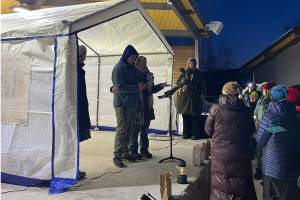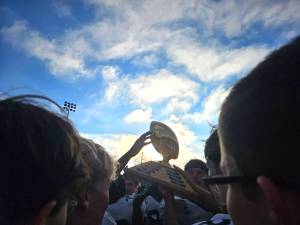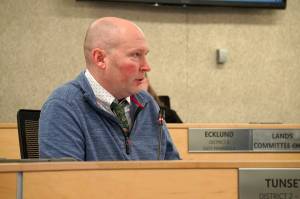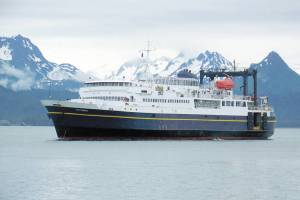Tentative education deal overshadowed by Knik Arm
Published 5:27 am Friday, April 25, 2014
JUNEAU (AP) — While lawmakers reached a tentative agreement on the education package that sent their session into overtime, another long-simmering issue re-emerged.
The House late Wednesday rejected a Senate-passed plan for financing the proposed Knik Arm bridge to connect Anchorage and the Matanuska-Susitna Borough, setting the stage for a conference committee to hash out differences.
The Capitol was oddly quiet for much of the day Thursday, with activity taking place behind the scenes as part of an effort to bring the extended session to a close. While waiting for something to happen, many lawmakers hung out in their offices, ducked out to pack up their living quarters or killed time in the sunshine outdoors.
“I’m hoping that before the sun goes down today we can all tip our hat and say, it’s been fun,” Senate President Charlie Huggins, R-Wasilla, said Thursday afternoon. Huggins had set a goal earlier in the session of getting out before Easter.
The issue of financing and responsibility for the bridge project flared up near the end of the last session after a scathing audit. The Senate put off deliberations until this year, and on April 12, passed the new financing approach.
The House didn’t take up a concurrence vote until Wednesday, day 93 of what was scheduled to be a 90-day session, when two Anchorage-area Republican lawmakers were absent, Reps. Lora Reinbold of Eagle River and Bob Lynn of Anchorage. The vote was 20-18; 21 votes were needed.
House Speaker Mike Chenault, R-Nikiski, said he may not have waited as long to bring the bill back up if he had known earlier that Lynn needed to take his wife back home for personal issues. Having two people off the floor “may or may not have made the difference” in the bill’s passage, he said.
The 90-day session was scheduled to end Sunday, but lawmakers rolled past that deadline after failing to reach agreement on an education package and, more specifically, on additional school funding. While voters approved a 90-day limit, the constitution allows for lawmakers to meet up to 121 days.
By going into an extended session, all bills remained in play. That’s why, even though education had been the stickler, Knik Arm came back. The capital budget also was still pending.
Huggins wanted the conference committees on education and the bridge project to close out together.
As for the education plan, the lead negotiators called it a good compromise, but critics said it fell far short on funding. The plan calls for $300 million in school aid over the next three years, $100 million in each of those years divided between the per-student funding formula known as the base student allocation and money to districts and programs or studies outside the formula.
Increases to the base student allocation are expected to total $37 million next year and $12.4 million each of the next two years, amounting to an increase of $250 per-student over the three years.
Many public school advocates have favored putting money into the formula as a way to provide reliable funding around which districts can budget, likening it to a permanent raise. Several groups endorsed an increase in the allocation of about $650 over three years to help districts stave off cuts and get on more stable footing, which minority Democrats also supported.
Annual one-time grants under the compromise would total about $43 million next year, $32 million in 2016 and about $20 million in 2017, according to the fiscal notes.
Ron Fuhrer, president of NEA-Alaska, said his group was still analyzing the funding but is hopeful that it would reverse the cuts districts are facing.
Kristin Bartlett, a spokeswoman for the Juneau School District, said by email that the “increased education funding goes a long way” toward meeting the needs of Juneau schools and students, but it won’t eliminate the need for the district to make budget cuts for the next school year. Juneau is expected to receive about $3.2 million extra next year.
The House, in its version of the education bill, HB278, proposed raising the allocation by about $300 over three years and providing $30 million in one-time aid to districts outside the formula. The Senate, as part of its education proposal, called for $100 million in aid outside the formula for each of the next three years, plus support for a range of other initiatives. Some senators were resistant to putting money into the formula, arguing the state is overdue for studying school funding.
The total cost of the Senate package was about $370 million, while the House proposal was about $210 million, according to the Legislative Finance Division.
The compromise bill includes provisions that would allow secondary school students to test out of core classes they have mastered, such as math, science and social studies. It would scrap the high school exit exam and replace it with a college or career-readiness test.
It includes funding to improve Internet service for schools with lower download speeds and support for charter, residential and correspondence schools. It also calls for a study of how the state pays for public schools.




